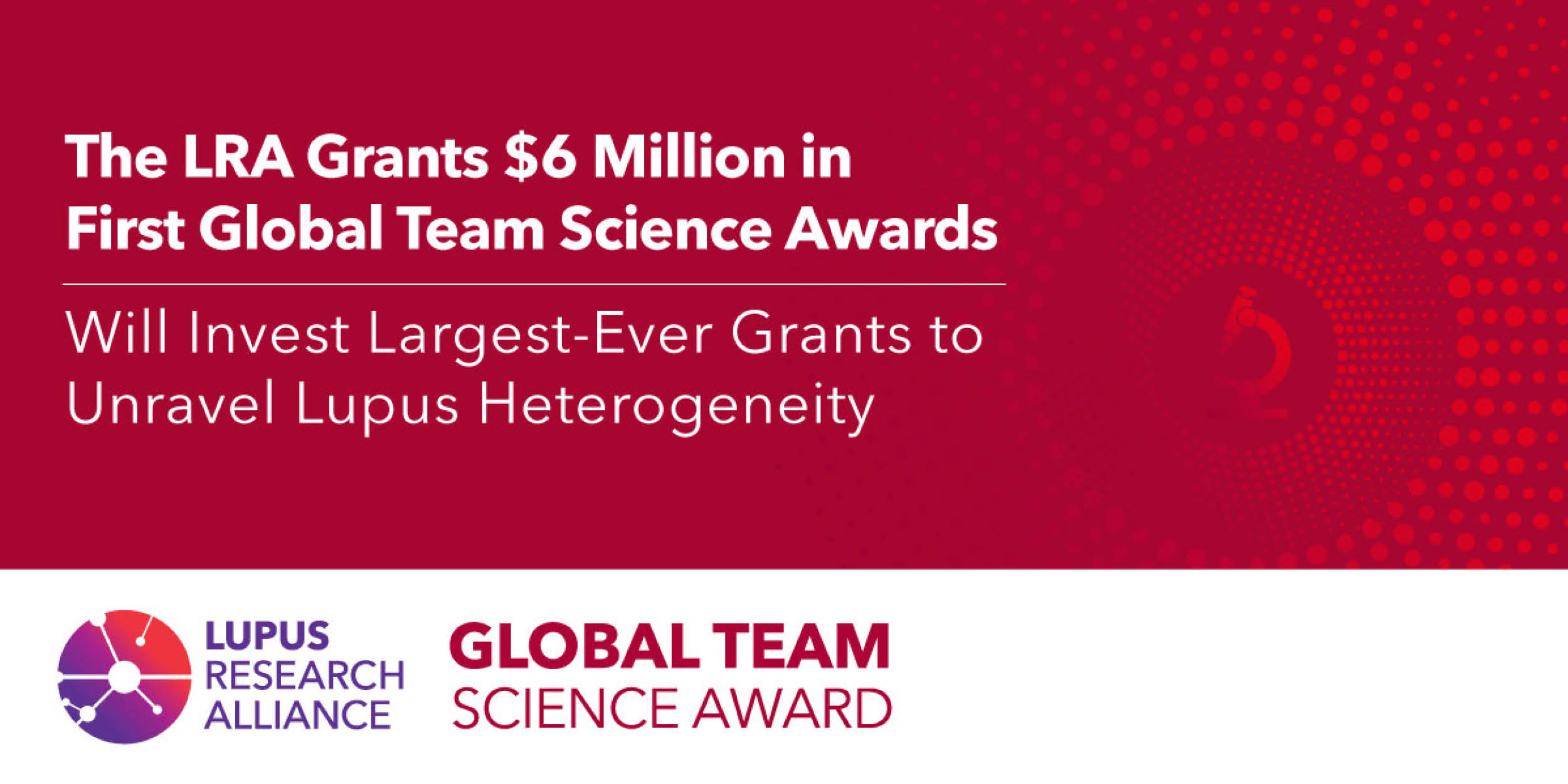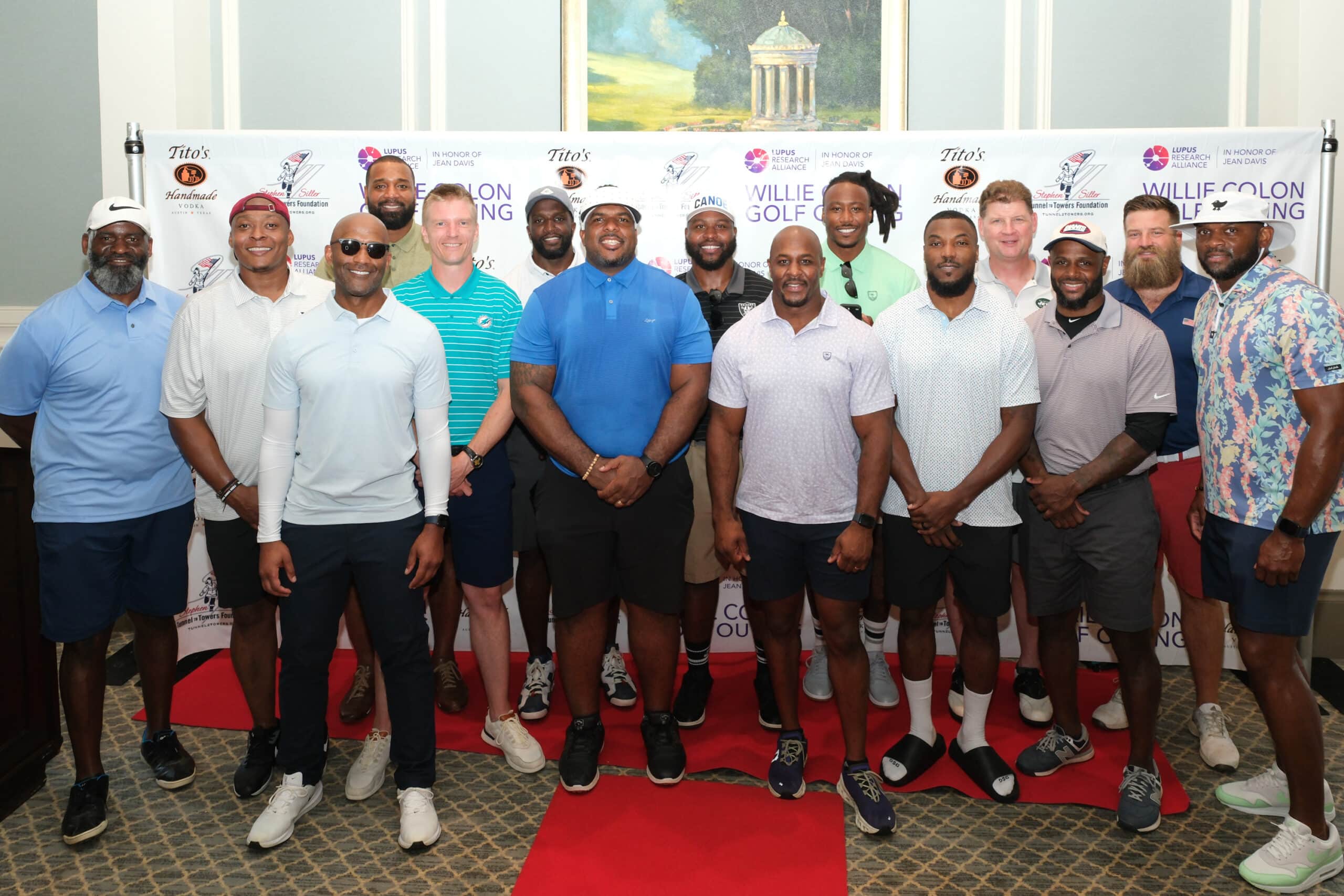Lupus Research Alliance Grants $6 Million in First Global Team Science Awards

Lupus Research Alliance Grants $6 Million in First Global Team Science Awards
This Largest-Ever Grant Will Fund Two Projects Examining Why Lupus Differs for Each Person
NEW YORK, NY. Sept. 21, 2021. Today, the Lupus Research Alliance is pleased to announce the inaugural recipients of its largest grant to date, the Global Team Science Award, which will fund international, multidisciplinary research teams to unravel lupus heterogeneity with the goal of leading to new personalized treatment approaches. The two 2021 awards will enable the work of teams led by internationally renowned lupus researchers Virginia Pascual, MD, Drukier Director of the Gale and Ira Drukier Institute for Children’s Health and Ronay Menschel Professor of Pediatrics at Weill Cornell Medicine; and Ignacio Sanz, MD, Mason I. Lowance Professor of Medicine and Pediatrics and Chief Division of Rheumatology, Emory University School of Medicine.
Providing $3 million to each multidisciplinary team over three years, the Global Team Science Award will support collaborative, and highly synergistic projects that push the boundaries of innovation to bridge research and clinical initiatives in lupus. Teams will untangle lupus heterogeneity by applying cutting-edge technologies to address critical questions that aim to bring about breakthroughs in lupus care, research, or drug development. These highly ambitious awards are made possible by a generous grant from Bloomberg Philanthropies.
“This award is the first of two key initiatives stemming from LRA’s strategic plan for research. As such, the Global Team Science Award embodies LRA’s strategic priorities of defining lupus heterogeneity, enabling patient stratification, and fostering collaborative global research and technology teams,” noted Teodora Staeva, PhD, LRA Chief Scientific Officer. “These first two projects selected from among many compelling proposals, examine important underlying mechanisms of the autoimmune response and point the way to potential new treatment approaches.”
The new Award received a robust response from the worldwide scientific community, and a committee of prominent investigators selected six projects to receive four-month planning grants to develop full applications. These were then reviewed by a specially empaneled study section followed by a high-level review by the LRA’s Scientific Advisory Board and ultimately by the LRA Board of Directors to select the two funded projects.
Identifying Differences in Genetic Makeup to Stratify Children with SLE into Specific Groups
The two-part project led by Dr. Pascual will categorize patients based on immune cell characteristics and how they impact individual disease activity. The first part will focus on identifying the immune cells that may track with how lupus affects pediatric patients so differently. Information on these immune cells will be recorded throughout various points of the disease pathway. In the second part, Dr. Pascual and her team will study the genetic differences that may be present among children with lupus and compare these genetic factors to that of healthy controls and their parents’ family members to help categorize groups of people with lupus.
“Our findings will help inform the development of targeted treatment for both children and adults based on our increased understanding of the characteristics and activities of each immune cell component involved throughout lupus progression.” said Dr. Pascual.
Dr. Pascual’s team consists of the following investigators: Dr. Peter Nigrovic (Immunology and Rheumatology), at Boston Children’s Hospital; Dr. Linda Hiraki (Genetic Epidemiology and Translational Research) at Toronto Hospital for Sick Children; Dr. Deepak Rao (Rheumatology and Immunology) at Brigham and Women’s Hospital; and Carola Garcia de Vinuesa (Rheumatology, Immunology and Autoimmunity) at Australian National University.
Linking Different B Cell Types to Lupus Symptoms, Progression and Response to Therapy
Dr. Ignacio Sanz and his team at three institutions will focus on identifying the characteristics of the B cells and plasma cells that create attacking antibodies in the development and progression of severe lupus specifically in African American patients. The project will define how the different characteristics of these cells correspond to patients’ responses to treatment.
“Each patient can respond differently to treatment and have a wide range of symptom severity – usually because of B cells and plasma cells – the cells behind the start of lupus, said Dr. Sanz. This research will allow us to further understand how this diversity impacts each patient experience, allowing us to cater, design, and evaluate clinical studies and standard of care treatments with the goal of implementing safer and more effective personalized treatments.”
The team led by Dr. Sanz includes several colleagues at Emory University: Drs. Frances Eun-Hyung Lee (Pulmonary-Allergy-Critical Care), Sung Sam Lim and Arezou Khosroshahi (Rheumatology), Jeremy Boss, and Christopher Scharer (Microbiology and Immunology); as well as Dr. Gary Gilkeson and Bethany Brown at Medical University of South Carolina; and Drs. Frances Lund and Alex Rosenberg (Microbiology and Immunology), Winn Chatham and Troy Randall (Rheumatology), at University of Alabama at Birmingham School of Medicine.
About Lupus
Lupus is a chronic, complex autoimmune disease that affects millions of people worldwide. More than 90 percent of people with lupus are women; lupus most often strikes during the childbearing years of 15-45. African Americans, Latinx, Asians and Native Americans are two to three times at greater risk than Caucasians. In lupus, the immune system, which is designed to protect against infection, creates antibodies that can attack any part of the body including the kidneys, brain, heart, lungs, blood, skin, and joints.
About the Lupus Research Alliance Global Team Science Award (GTSA)
Incomplete understanding of the tremendous clinical and mechanistic heterogeneity of SLE – how it differs from person to person – remains a central challenge to developing safer and more effective treatments and to improving the standard of care for lupus patients. To address this impediment, the Lupus Research Alliance established the Global Team Science Award in 2020. The Award supports highly ambitious projects that build teams of established scientists from around the world to combine their expertise in diverse fields including technology, informatics (the study of information processing) immunology, and clinical research to work on a common project from distinct perspectives. It is expected that GTSA Teams will bring about breakthroughs with a high potential for transforming lupus care tomorrow.
About the Lupus Research Alliance
The Lupus Research Alliance is the largest non-governmental, non-profit funder of lupus research worldwide. The organization aims to transform treatment by funding the most innovative lupus research, fostering diverse scientific talent, and driving discovery toward better diagnostics, improved treatments and ultimately a cure for lupus. Because the Lupus Research Alliance’s Board of Directors funds all administrative and fundraising costs, 100% of all donations goes to support lupus research programs.
# # #



